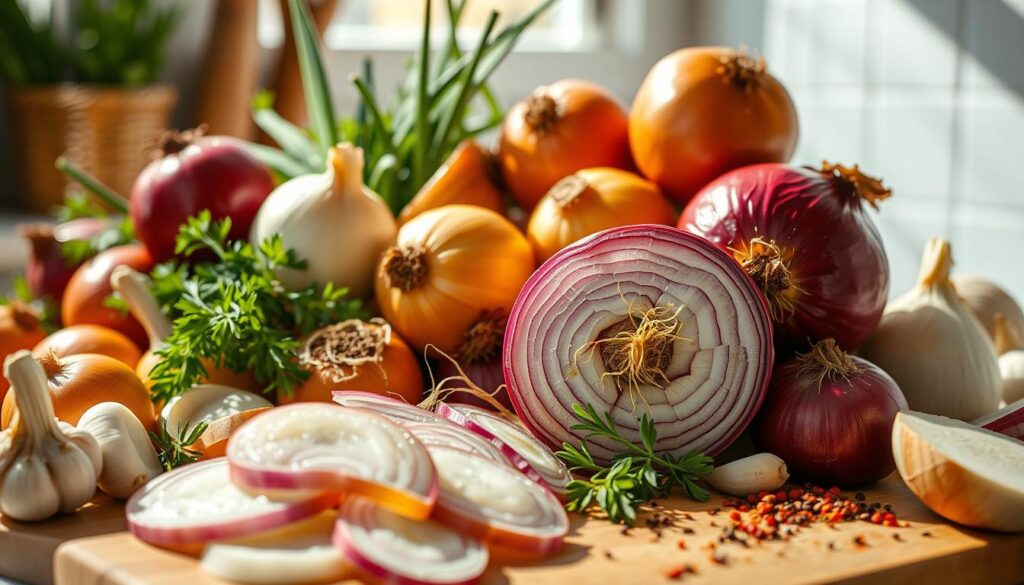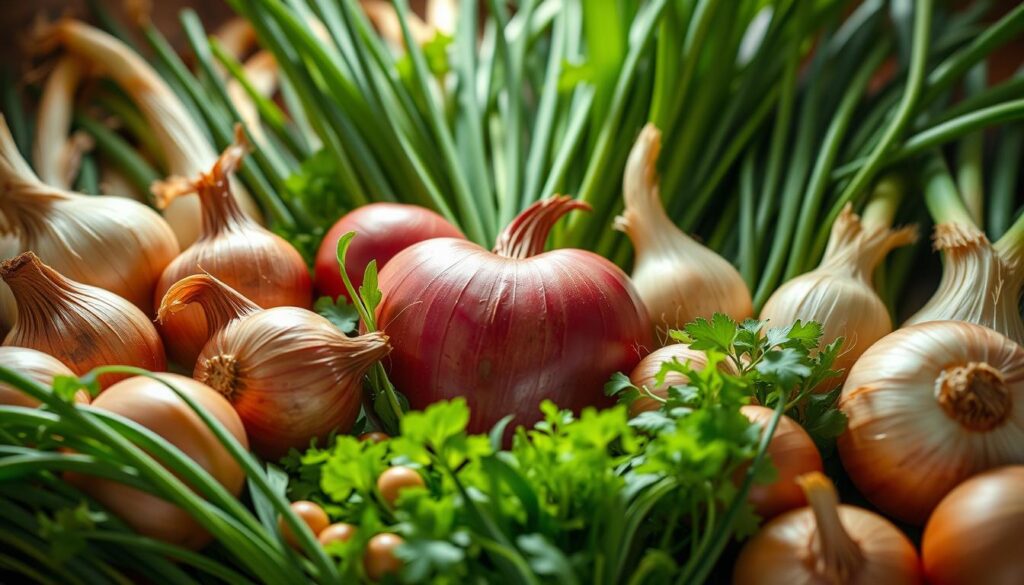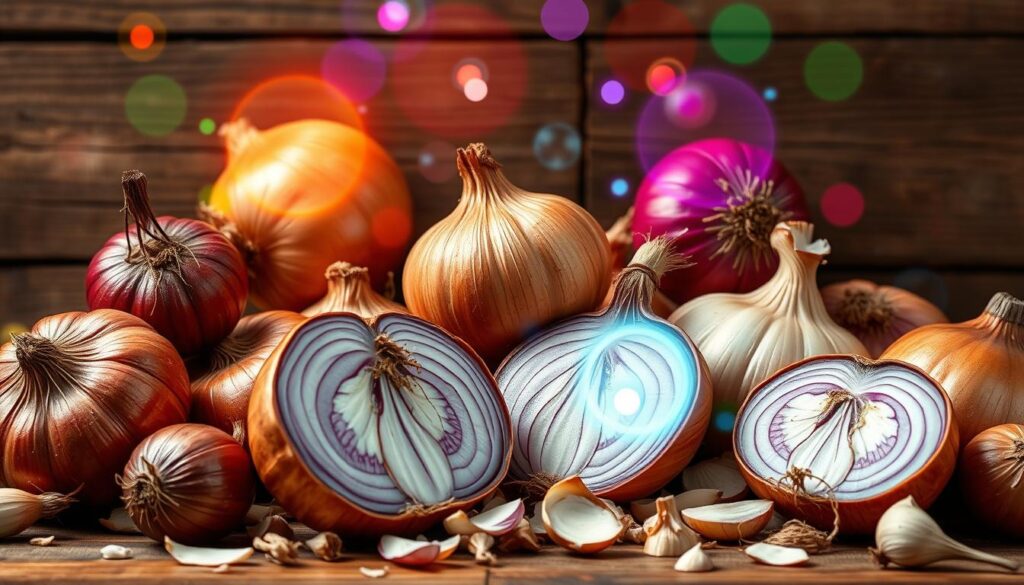Have you ever thought that onions could be key to better health? Often seen as just a flavor booster, onions are packed with vitamins and nutrients. They are a treasure trove of antioxidants, fiber, and vitamins C and B6.
Many people don’t realize how good onions are for them. They can help your heart and boost your immune system. This article will show you why onions are a must-have in your diet.
Key Takeaways
- Onions belong to the Allium genus, which includes garlic and leeks.
- Rich in antioxidants, onions help repair and protect damaged cells.
- Onions contain vitamin C and flavonoids like quercetin, promoting immune health.
- With anti-inflammatory properties, onions can aid in chronic disease prevention.
- Onions are a great source of dietary fiber essential for digestive health.
- Consuming onions may help regulate blood sugar levels effectively.
The Nutritional Value of Onions
Onions are more than just a tasty addition to meals. They are packed with nutrients. Onions are rich in vitamins C and K, which are good for your health. Understanding how these vitamins work in your body makes onions a great food choice.
Vitamin C Content in Onions
Onions are known for their vitamin C. This vitamin is key for a strong immune system and healthy skin. A medium onion gives you about 9% of the daily vitamin C you need. This makes onions a great choice for boosting your immune system.
Other Essential Vitamins Found in Onions
Onions are also a good source of vitamin K, which helps with blood clotting and bone health. They also have vitamin B6, which helps with energy. With all these vitamins, onions offer many health benefits, improving your overall well-being.
| Nutritional Component | Amount per Medium Onion (110g) |
|---|---|
| Calories | 44 |
| Protein | 1.2g |
| Carbohydrates | 10.3g |
| Sugar | 4.7g |
| Fiber | 1.9g |
| Fat | 0.1g |
| Potassium | 3.4% of DV |
| Vitamin C | 9% of DV |
| Vitamin K | Varies |
Onion Advantages, Vitamins

Adding onions to your meals is a smart move for your health. They are not just tasty but also packed with nutrients. Onions have antioxidants, vitamins, and minerals that are good for you.
Rich in Antioxidants and Flavonoids
Onions are full of quercetin and allicin, which fight off harmful stress in the body. They also have a lot of vitamin C, which helps your body absorb calcium better. This is great for your bones.
Onions can also help control blood sugar levels because of chromium. This mineral keeps your energy up and prevents big drops in energy.
Health Benefits of Adding Onions to Your Diet
Eating onions regularly can really help your health. They might lower the risk of some cancers, like colorectal and breast cancer. Onions are also full of fiber, which is good for your gut.
Onions have anti-inflammatory properties that boost your immune system. They help you recover faster and reduce inflammation. Plus, they are low in calories but high in health benefits, making them a great choice for a healthy diet.
The Role of Onions in Immune Support

Onions are great for boosting your immune system. They are packed with nutrients that help keep you healthy. The main reason is quercetin, a powerful antioxidant found in onions.
This antioxidant fights off harmful pathogens and helps control your immune system. It’s very helpful during flu and cold seasons.
How Onions Strengthen the Immune System
Onions are full of Vitamin C, which is good for your immune system. Vitamin C reduces inflammation and fights off free radicals. This helps keep your immune system strong.
Onions also have high antioxidant levels. Eating onions often can lower your risk of getting sick. They are a great addition to any meal.
Quercetin: The Immune Booster in Onions
Quercetin in onions does more than just boost your immune system. It acts as an antiviral agent, helping your body fight off viruses like the flu and COVID-19. It also has anti-inflammatory and antioxidant properties.
These properties help reduce the risk of chronic diseases. Onions are a natural remedy that can be used in many dishes.
| Nutrient | Benefits |
|---|---|
| Vitamin C | Supports immune function, reduces inflammation, aids calcium absorption |
| Quercetin | Fights viruses, modulates immune response, lowers blood pressure |
| Chromium | Regulates blood sugar, sustains energy levels, prevents crashes |
| Flavonoids | Act as antioxidants, enhance immune properties |
Adding onions to your meals is easy and tasty. Try them in salads, soups, or as a sautéed side dish. Onions are versatile and can make your food more flavorful while providing health benefits.
Onions and Heart Health

Onions are great for your heart. They are full of nutrients and special compounds. These help manage cholesterol and improve heart function.
Lowering Cholesterol Levels with Onions
Eating onions can lower your cholesterol. This is key to avoiding heart disease. The quercetin in onions helps control cholesterol and prevents artery buildup.
Adding onions to your meals is tasty. It’s also good for onions heart health.
Onions’ Antioxidant Properties in Cardiovascular Health
Onions have lots of onion antioxidant properties. These fight oxidative stress and inflammation. Quercetin, in particular, helps lower blood pressure and improve blood flow.
Eating onions is delicious and good for your heart. It’s a smart choice for a healthier heart.
| Nutrient | Amount per 1 cup (chopped) |
|---|---|
| Calories | 64 |
| Carbohydrates | 14.9g |
| Fiber | 2.72g |
| Fat | 0.2g |
| Vitamin C | 13.11% of daily value |
Onions are key to a healthier heart. They should be part of your daily diet. Enjoy their benefits for a better heart.
The Anti-Inflammatory Effects of Onions

Onions are more than just a tasty addition to meals. They are full of anti-inflammatory onions that are good for your health. The natural compounds in onions help reduce inflammation, making them a key part of a healthy diet. The sulfur in onions is key to these benefits.
How Sulfur Compounds in Onions Support Inflammation Reduction
Onions are rich in sulfur compounds, which are known for their health benefits. Compounds like quercetin help lower inflammation in the body. They block pathways that cause inflammation, improving your health. Eating onions regularly can help with inflammation-related conditions.
Potential Benefits for Chronic Inflammatory Conditions
Chronic inflammation can really affect your life. Adding onions to your diet might help manage symptoms. Studies show eating more onions can lower the risk of certain cancers, like stomach and breast cancer. This shows how important onion nutrients are for long-term health.
| Onion Type | Antioxidant Content | Sulfur Compounds |
|---|---|---|
| White Onions | Lowest | Moderate |
| Yellow Onions | Higher | High |
| Red Onions | Highest | High |
Knowing the onions health benefits and nutrients they offer helps you make better food choices. These choices can help reduce inflammation and improve your overall well-being.
Incorporating Onions into Your Daily Diet

Onions are a key ingredient in many dishes, adding flavor and nutrition. They can be the main attraction or a supporting role. Cooking with onions brings out their taste and health benefits. Here are some tasty onion recipes and creative ways to add onions to your meals.
Delicious Onion Recipes to Try
Onions are great for making savory dishes. Try these popular onion recipes to spice up your meals:
- French Onion Soup – A classic dish that showcases the rich, caramelized flavor of onions.
- Onion Rings – A crunchy and irresistible snack that pairs well with burgers and sandwiches.
- Stuffed Onions – Hollowed onions filled with meat, grains, and spices, baked to perfection.
- Sautéed Vegetables – Add onions for extra flavor in your mix of seasonal veggies.
Creative Ways to Use Onions in Cooking
There are many ways to use onions in cooking, beyond the usual. Try these creative ideas:
- Try adding raw onions to salads for a zesty crunch.
- Grill onion slices on skewers alongside meats or vegetables for a smoky flavor.
- Use caramelized onions as a topping for pizzas or baked potatoes.
- Blend onions into dressings and dips for a flavor boost.
With over 105 billion pounds of onions harvested each year, there’s a lot to explore. Start trying these onion recipes and ideas. Discover the flavor and health benefits onions offer. Enjoy finding new ways to cook with onions every day.
Onions: Myths and Facts

Onions are often misunderstood, with many myths about their health benefits. You might have heard myths about onions that change how you see them. The big question is: are onions a superfood? They have health benefits that make them seem like a superfood, but there’s debate.
Are Onions Considered a Superfood?
Health experts say onions could be a superfood because of their nutrients. They have antioxidants like quercetin and flavonoids, which are good for the heart and reduce inflammation. Eating onions regularly might help prevent chronic diseases, making them key to a healthy diet. This makes them a strong candidate for the superfood label, debunking some myths about onions.
Do Onions Really Contain Vitamin A and D?
Onions don’t have much vitamin A or vitamin D. But they are rich in vitamins C and B6, and minerals. If you’re wondering do onions have vitamin a or do onions have vitamin d, the answer is no. They are important for nutrition, but not for these vitamins.
| Nutritional Aspect | Onions | Superfood Comparison |
|---|---|---|
| Vitamin A Content | Negligible | Higher in Carrots/Sweet Potatoes |
| Vitamin D Content | Negligible | Higher in Fatty Fish/Fortified Foods |
| Key Antioxidant | Quercetin | Common in Other Superfoods (Berries, Green Tea) |
| Health Benefits | Heart health, anti-inflammatory | Varies by Superfood |
Micronutrients in Onions

Onions add flavor to meals and are packed with micronutrients. They are rich in folic acid, which is key for DNA repair. Pregnant women should eat onions to prevent birth defects. Onions also have important minerals found in onions that boost health.
Folic Acid and Its Importance for Health
Folic acid, or vitamin B9, is essential for many body functions. It helps make red blood cells and turns carbs into energy. Eating onions gives you about 5% of the daily folate you need.
Minerals Found in Onions: Potassium, Magnesium, and More
Onions are full of minerals like potassium and magnesium. They have a lot of potassium, which is good for your heart. Potassium keeps blood pressure in check and helps muscles work right. Onions also have magnesium, about 2% of what you need daily.
Here’s a table showing the minerals in onions:
| Mineral | Content per 100g Serving | Percentage of Daily Value |
|---|---|---|
| Potassium | 146mg | 3% |
| Magnesium | 10mg | 2% |
| Calcium | 22mg | 2% |
| Iron | 0.2mg | 1% |
Onions are a great food because of their folic acid and minerals. They’re easy to add to your diet.
Conclusion
Adding onions to your meals can make them taste better and be healthier. Onions are full of vitamins and are low in calories, fat, and cholesterol. They are great for your health.
Onions have lots of antioxidants and flavonoids. These help boost your immune system, improve heart health, and reduce inflammation. They are very beneficial.
Onions do more than just taste good. Eating them every day can lower cholesterol and reduce heart disease risk. They also have quercetin, which may stop cancer cells from growing. This makes onions a key part of a healthy diet.
Onions are not just good for you; they also make food taste better. You can eat them raw, cooked, or baked. They offer many health benefits. Adding onions to your meals can greatly improve your health.

